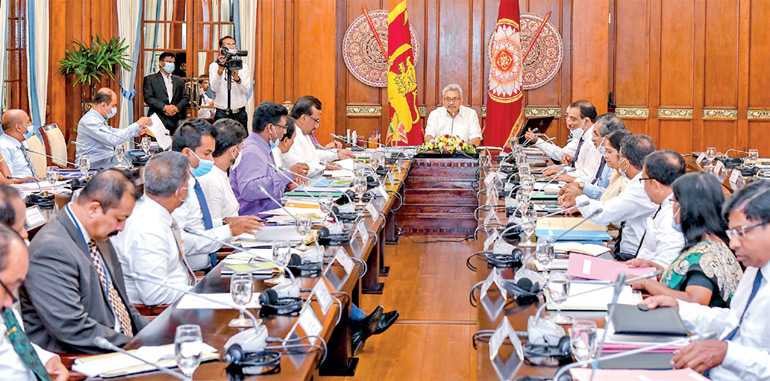Tuesday Feb 24, 2026
Tuesday Feb 24, 2026
Friday, 18 September 2020 00:00 - - {{hitsCtrl.values.hits}}

President Gotabaya Rajapaksa this week instructed officials to implement a short-term and long-term plan in collaboration with the public and private companies as well as small-scale farmers, to meet the local demand for liquid milk.
The President stressed the need to improve grass cultivation, dairy cow breeding, and research institute services to achieve the set targets expeditiously.
President Rajapaksa made these remarks during a meeting held at the Presidential Secretariat on Monday, to discuss future activities of the State Ministry of Livestock Farm Promotion and Dairy and Egg Related Industries.
The Government intends to expand the research activities that would help in introducing new breeds of dairy cattle, suitable for different geographical areas of the country.
It was pointed out that less than 40% of the country’s annual liquid milk requirement is produced locally, and as a result, people are deprived of the opportunity to consume nutritious fresh liquid milk.
President has pledged to increase liquid milk production in the next decade in his National Policy Framework ‘Vistas of Prosperity and Splendour’.
During this meeting, the cultivation of high quality grasses and cattle feed production to increase the production of milk was also discussed at length.
Presidential Task Force on Economic Revival Chairman Basil Rajapaksa pointed out small-scale dairy farmers provide 85% of the total liquid milk production, and that they should be further strengthened.
“Farmers are discouraged due to the rising cost of production per litre of milk,” he added.
The Chairman also pointed out the need to provide dairy farmers with cattle feed, including grasses, under concessionary rates. It was pointed out that farmers should be encouraged at the institutional level to produce animal feed needed for both the public and private sector.
Highlighting the importance of involvement of the Central Environmental Authority (CEA) in resolving issues related to animal husbandries, President Rajapaksa said that these measures should not be a burden on the farmer.
Presidential Task Force on Economic Revival Chairman Rajapaksa said animal farms run traditionally should not be closed down based on complaints by the public without conducting an investigation.
Agriculture Minister Mahindananda Aluthgamage said measures have been taken to rear 15,000 milking cows, with the assistance of 15 estate companies, with the aim of increasing the dairy production.
Expanding the production of chicken and eggs and diverting large-scale producers to the export market was also discussed during the meeting. Stakeholders of the private sector said they anticipate foreign exchange earnings of $ 16 million in 2020 by exporting eggs, chicken, and related products.
Secretary to the President Dr. P. B. Jayasundera, Secretaries to Cabinet and State Ministries, heads of line institutes, and several private-sector investors were also present during the meeting.


